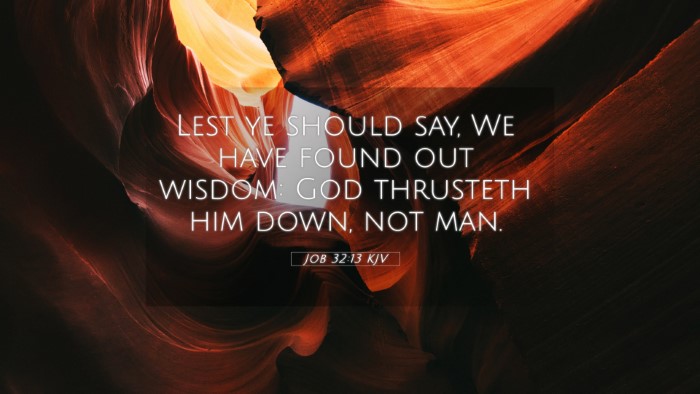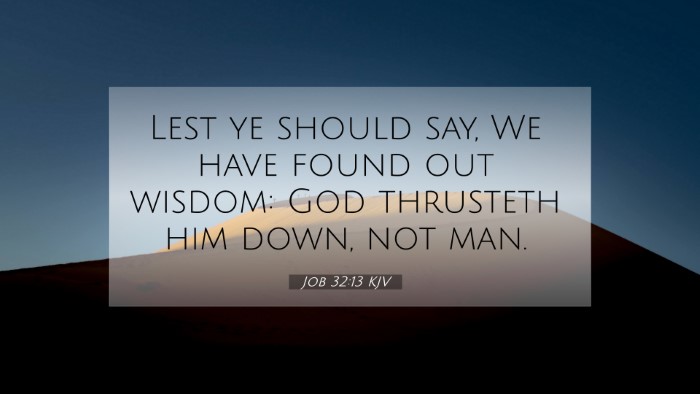Old Testament
Genesis Exodus Leviticus Numbers Deuteronomy Joshua Judges Ruth 1 Samuel 2 Samuel 1 Kings 2 Kings 1 Chronicles 2 Chronicles Ezra Nehemiah Esther Job Psalms Proverbs Ecclesiastes Song of Solomon Isaiah Jeremiah Lamentations Ezekiel Daniel Hosea Joel Amos Obadiah Jonah Micah Nahum Habakkuk Zephaniah Haggai Zechariah MalachiJob 32:13 Similar Verses
Job 32:13 Cross References
Lest ye should say, We have found out wisdom: God thrusteth him down, not man.
Uncover the Rich Themes and Topics of This Bible Verse
Listed below are the Bible themes associated with Job 32:13. We invite you to explore each theme to gain deeper insights into the Scriptures.
Job 32:13 Cross Reference Verses
This section features a detailed cross-reference designed to enrich your understanding of the Scriptures. Below, you will find carefully selected verses that echo the themes and teachings related to Job 32:13 KJV. Click on any image to explore detailed analyses of related Bible verses and uncover deeper theological insights.

Jeremiah 9:23 (KJV) »
Thus saith the LORD, Let not the wise man glory in his wisdom, neither let the mighty man glory in his might, let not the rich man glory in his riches:
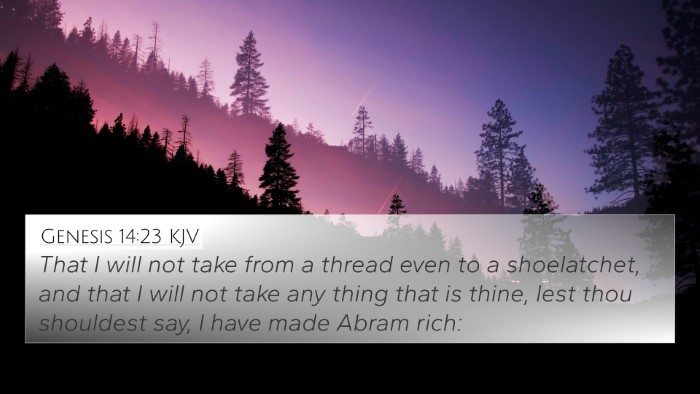
Genesis 14:23 (KJV) »
That I will not take from a thread even to a shoelatchet, and that I will not take any thing that is thine, lest thou shouldest say, I have made Abram rich:
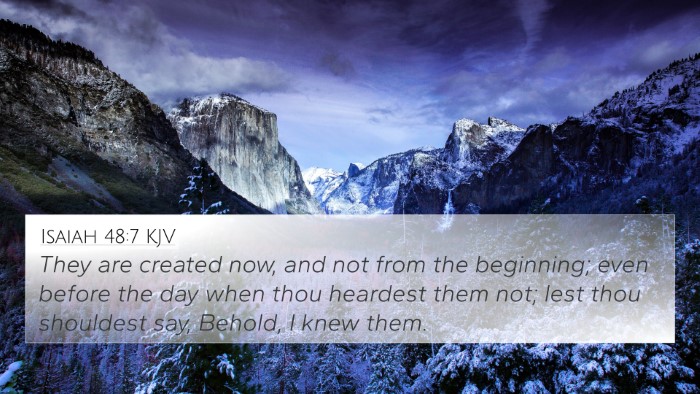
Isaiah 48:7 (KJV) »
They are created now, and not from the beginning; even before the day when thou heardest them not; lest thou shouldest say, Behold, I knew them.

Ezekiel 28:3 (KJV) »
Behold, thou art wiser than Daniel; there is no secret that they can hide from thee:

Zechariah 12:7 (KJV) »
The LORD also shall save the tents of Judah first, that the glory of the house of David and the glory of the inhabitants of Jerusalem do not magnify themselves against Judah.

John 19:11 (KJV) »
Jesus answered, Thou couldest have no power at all against me, except it were given thee from above: therefore he that delivered me unto thee hath the greater sin.

1 Corinthians 1:19 (KJV) »
For it is written, I will destroy the wisdom of the wise, and will bring to nothing the understanding of the prudent.

1 Corinthians 1:27 (KJV) »
But God hath chosen the foolish things of the world to confound the wise; and God hath chosen the weak things of the world to confound the things which are mighty;
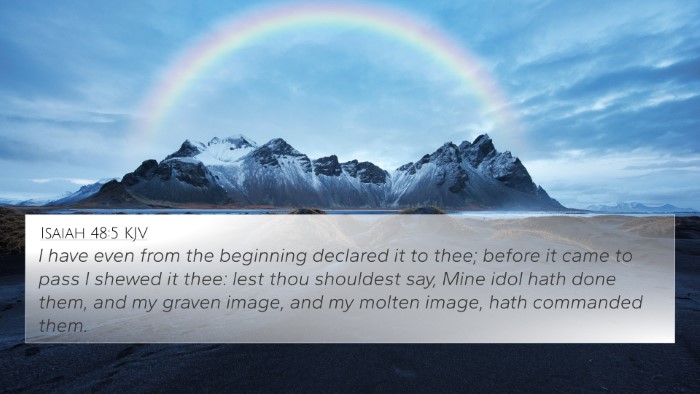
Isaiah 48:5 (KJV) »
I have even from the beginning declared it to thee; before it came to pass I shewed it thee: lest thou shouldest say, Mine idol hath done them, and my graven image, and my molten image, hath commanded them.
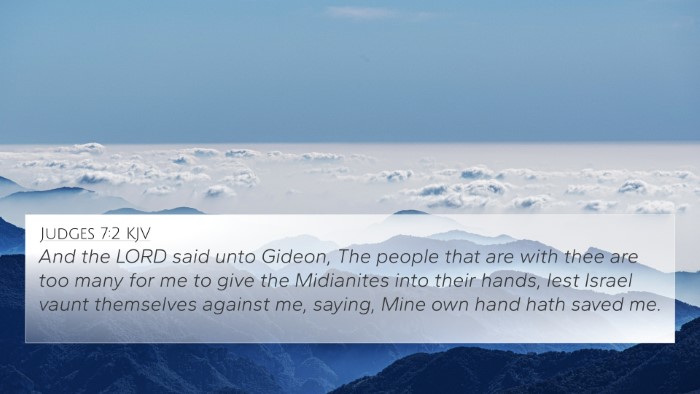
Judges 7:2 (KJV) »
And the LORD said unto Gideon, The people that are with thee are too many for me to give the Midianites into their hands, lest Israel vaunt themselves against me, saying, Mine own hand hath saved me.

Job 19:21 (KJV) »
Have pity upon me, have pity upon me, O ye my friends; for the hand of God hath touched me.

Job 1:21 (KJV) »
And said, Naked came I out of my mother's womb, and naked shall I return thither: the LORD gave, and the LORD hath taken away; blessed be the name of the LORD.

Job 4:9 (KJV) »
By the blast of God they perish, and by the breath of his nostrils are they consumed.

Job 2:10 (KJV) »
But he said unto her, Thou speakest as one of the foolish women speaketh. What? shall we receive good at the hand of God, and shall we not receive evil? In all this did not Job sin with his lips.

Job 6:4 (KJV) »
For the arrows of the Almighty are within me, the poison whereof drinketh up my spirit: the terrors of God do set themselves in array against me.

1 Corinthians 3:18 (KJV) »
Let no man deceive himself. If any man among you seemeth to be wise in this world, let him become a fool, that he may be wise.
Job 32:13 Verse Analysis and Similar Verses
Understanding Job 32:13
Job 32:13 states: "Lest you say, 'We have found wisdom; God may vanquish him, not a man.' This verse introduces a critical moment in the dialogue of Job, where Elihu, the fourth friend, speaks after the long arguments made by Job and his friends regarding suffering, justice, and the character of God.
Meaning and Context
In this passage, Elihu asserts that human wisdom is not sufficient to contend with God’s righteousness and understanding. Here’s a summary of insights from various public domain commentaries:
- Matthew Henry: He emphasizes that Elihu's intent is to assert that God's ways are beyond human comprehension and that relying solely on human wisdom could lead to misguided conclusions about God. He also suggests that Elihu's speech serves to humble Job by reminding him of the greatness of God’s wisdom.
- Albert Barnes: He comments on the nature of wisdom, stating that human beings must not boast in their understanding in relation to God. Elihu’s statement functions as a warning against the arrogance found in claiming absolute truth in the face of divine mystery.
- Adam Clarke: Clarke views the verse as a marker of Elihu’s role as a mediator of truth. He underscores the futility of arguing with God and adds that Elihu’s perspective is meant to lead both Job and the other friends towards a more profound understanding of divine justice.
Bible Verse Cross-References
This verse connects with several other passages that emphasize similar themes of divine wisdom and human understanding.
- Isaiah 55:8-9 – "For my thoughts are not your thoughts, neither are your ways my ways, declares the Lord." This passage highlights the vast difference between God's understanding and human reasoning.
- 1 Corinthians 1:25 – "For the foolishness of God is wiser than men; and the weakness of God is stronger than men." Paul echoes the sentiment that divine wisdom surpasses human wisdom.
- Job 38:2-4 – "Who is this that obscures my plans with words without knowledge?" God questions Job, pointing to human limitations in understanding divine purpose.
- Romans 11:33 – "Oh, the depth of the riches of the wisdom and knowledge of God!" This passage celebrates the incomprehensibility of God's wisdom.
- Proverbs 3:5-6 – "Trust in the Lord with all your heart and lean not on your own understanding." A powerful reminder to rely on God's wisdom over our limited insights.
- Psalms 147:5 – "Great is our Lord, and of great power: his understanding is infinite." This verse asserts the limitless nature of God's understanding.
- James 1:5 – "If any of you lacks wisdom, let him ask of God, who gives generously to all without reproach." A guide for seeking divine wisdom rather than relying solely on human reasoning.
- Proverbs 14:12 – "There is a way that seems right to a man, but its end is the way of death." This verse warns against misplaced confidence in human judgment.
- Ecclesiastes 7:13 – "Consider the work of God: for who can make that straight, which he hath made crooked?" It emphasizes human limitations in understanding God’s plans.
- Job 5:9 – "Who does great things and unsearchable, marvelous things without number." Echoing Elihu’s assertion of God’s unparalleled power and wisdom.
Thematic Connections
Job 32:13 encourages a deep reflection on the nature of wisdom, particularly in the context of suffering and divine justice. The following themes are explored through these inter-Biblical connections:
- Divine Wisdom vs. Human Wisdom: A recurring theme in both the Old and New Testaments.
- Human Limitations: God's ways and thoughts are superior to human understanding.
- Trusting God: The importance of faith in God's plan, even in times of suffering.
Practical Application
Understanding Job 32:13 can enhance our approach to suffering and our relationship with divine wisdom. Here are some practical takeaways:
- Seek understanding from God's Word rather than solely from human reasoning.
- Humble oneself before the mysteries of God, acknowledging our limitations.
- Utilize tools for Bible cross-referencing to enrich your Bible study and personal growth.
- Engage in community discussions about insights drawn from cross-referenced themes to deepen understanding.
Conclusion
In Job 32:13, Elihu's profound assertion serves as a call to recognize the supremacy of God's wisdom. By engaging deeply with this verse and exploring its connections through cross-references, believers can gain insight into the complexities of divine justice and the nature of human understanding.

